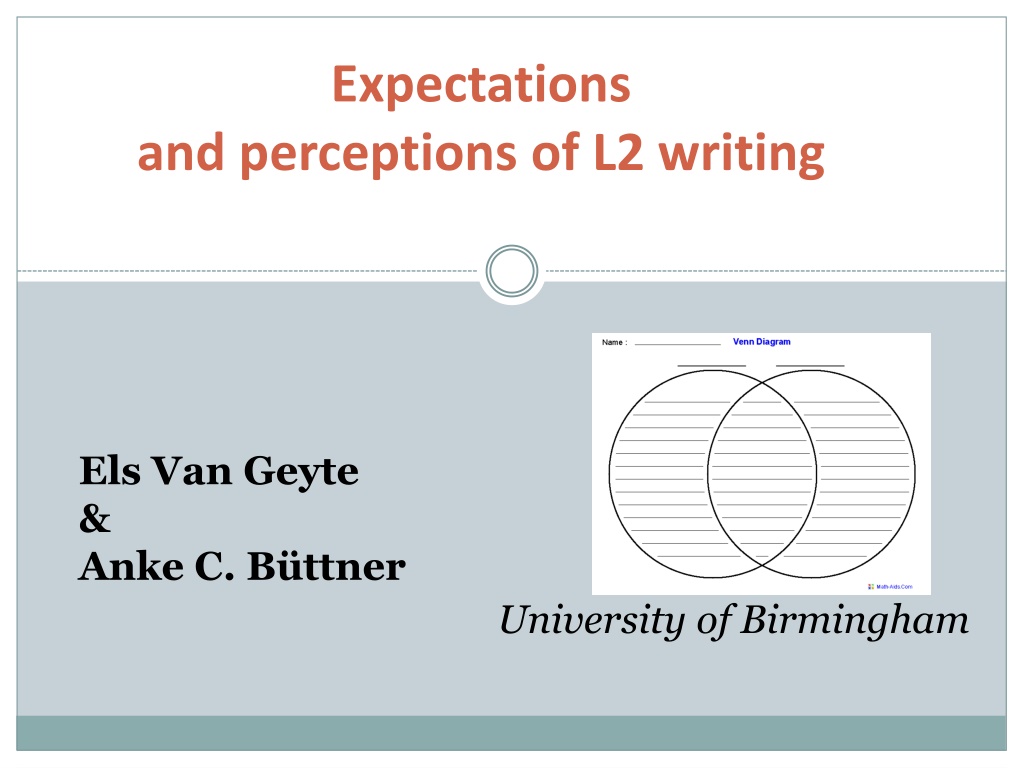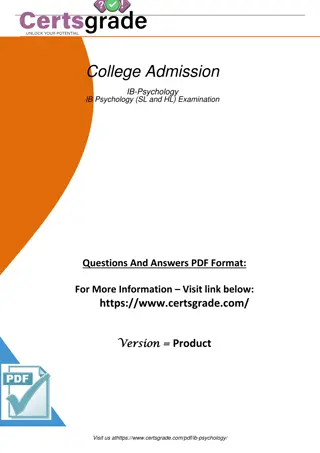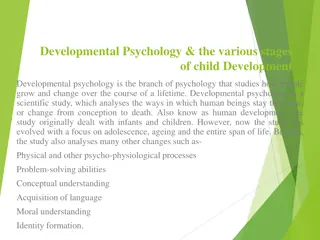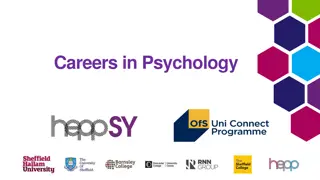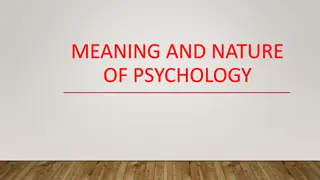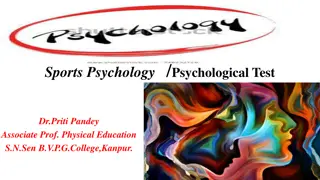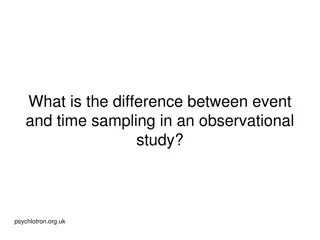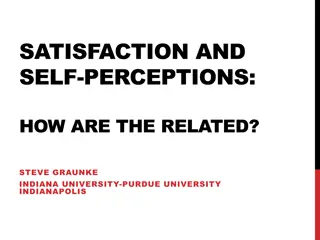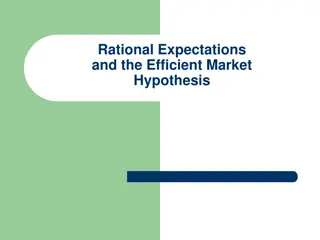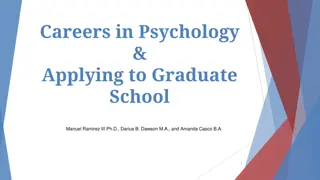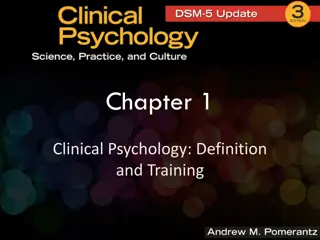Exploring Expectations and Perceptions of L2 Writing in Psychology Study
In this research project, the focus is on the expectations and perceptions of L2 academic writing skills among Psychology students. The study aims to help students enhance their academic writing abilities and understand the differences in expectations between EAP teachers and subject-specific instructors. The project involves a formal research report assignment, offering practical writing experience to students before their final year dissertation. Limitations include a small sample size and potential for scaling up the experiment for broader insights.
Download Presentation

Please find below an Image/Link to download the presentation.
The content on the website is provided AS IS for your information and personal use only. It may not be sold, licensed, or shared on other websites without obtaining consent from the author. Download presentation by click this link. If you encounter any issues during the download, it is possible that the publisher has removed the file from their server.
E N D
Presentation Transcript
Expectations and perceptions of L2 writing Els Van Geyte & Anke C. B ttner University of Birmingham
The purpose of the EAP practitioner EAP: takes practitioners beyond preparing learners for study in English to developing new kinds of literacy: equipping students with the communicative skills to participate in particular academic and cultural contexts. Hyland, K. and Hamp-Lyons, L., 2002. EAP: Issues and directions. Journal of English for academic purposes, 1(1), pp.1-12. [page 2]
The dilemma of the EAP practitioner Wingate, U., 2016. Embedding academic literacy instruction in the curriculum: The role of EAP specialists (plenary at the BALEAP PIM at LSE) https://www.youtube.com/watch?v=jxITuxRwqLE Murray, N., 2016. An academic literacies argument for decentralizing EAP provision. ELT Journal, p.ccw030. Johns, T.F. and Dudley-Evans, A., 1980. An experiment in team-teaching of overseas postgraduate students of transportation and plant biology. Team teaching in ESP, pp.6- 23. Working with subject-specific lecturers?
Expectations and perceptions of L2 writing Project questions How can we help students improve their academic writing skills? What can EAP teachers learn from subject-specific teachers? Are our expectations and perceptions of L2 academic writing skills different? What should we focus our attention on as EAP teachers? [30-minute 1-1s; excerpts, no context] Call for participants (psychology,cancer studies)
Caveat Limitations: small sample, one department, tutor with high level of language awareness Scope for repeating the experiment on a larger scale (more tutors and students)
Expectations and perceptions of L2 writing Project context Assignment: Formal Research Report (Psychology) 2000 words, individually composed; 30% of module grade; submitted in Week 7 of first 11 week Semester. Aim: provide students with opportunity to practise writing reports before final year dissertation. Course: First of two second year compulsory modules in Research Methods (20 credits) Cohort: 300 UG-students, most studying on BSc Psychology.
Project method Permission from international students in Psychology Random sample of assignments 6 were enough for variety of language skills levels No info about student (language) background or grade received Most interesting sections were: - impression made at the start with title, abstract, introduction - method and results were less discursive
Method: Trial/error designed a form Title Abstract Introduction Examples of language errors (and area (e.g. tenses) if possible) Main problem in this section Areas of strength Overall effect on reader Comments about the organisation of the piece? Comments about the argumentation in the piece? Other comments?
Example of introduction comments 1 Language errors and main problem use of language is unidiomatic (e.g. opening sentence) 2 Language errors and main problem Tenses: It impaired should be It impairs or It has been shown to impair wrong tense Articles: should be a better quality , the effect of self-efficacy , the main challenge , the tendency (and other examples) incorrect use of/missing articles Lack of detail: what is excessive fear? Perhaps a little long-winded in establishing links between concepts Verb patterns: helpful to reduce (in reducing) The impression is that there is a lot of good information but that it does not fit together well Well-researched and argued but difficult to read The incorrect use of the past tense and the paragraph organisation/lack of topic sentences have a disorientating effect
Comparison between Subject tutor and EAP tutor: Similarities We picked up on the same language issues We were equally impressed (or not) by the pieces as shown in the strengths and effect on the reader sections. We always agreed where there was lack of clarity in the pieces (but did not always identify the same reasons why)
Comparison between Subject tutor and EAP tutor: Differences EAP tutor Subject tutor + unsurprisingly, saw the main problem as related to facts, explanations, conceptual language (vs. EAP tutor: the inappropriate language choices) - did not always specifically identify lack of language to guide the reader (through e.g. topic sentences or signposting) + picked up on more detail about language: areas and specific issues - did not always pick up on lack of necessary detail (minor definitions, support for all claims, more explanatory details of methods) where the larger organisation of the piece was quite logical - Organisation and argumentation were interpreted slightly differently
Quick quantitative look at the data: language key words Key Word/Idea Missing articles Issues with tenses Verb forms/SVA Word choice Grammar Format ( sounds ) Subject tutor EAP tutor 10 7 6 1 2 1 11 9 7 3 8 5
Quick quantitative look at the data: writing key words Key Word/Idea Argument/argumentation Logical structure Rationale/aim/purpose/motivation Subject tutor EAP tutor 6 4 5 5 5 5 Flow/cohesion/narrative/links Use of technical language/jargon/definitions Issues with paragraphing 22 8 13 2 12 6 Clarity/comprehensibility Expectations of reader/subject 6 1 19 7
Outcomes (1) What can we learn from the differences in focus? Subject tutor identifies content issues better Agreed that lack of clarity often correlates to lack of content EAP tutor should never assume their lack of subject knowledge is responsible for any lack of understanding EAP added value: outside perspective, able to question at face value
Outcomes (2) Where do rhetorical strategies that bridge language and content matter fit ? Argument and organisation are related; distinction is relatively artificial. Organisation is about paragraphing and structure (clear ideas in the wrong order are confusing); Argumentation is about relevance What is the writer s point? Are they using the evidence wisely and making good links? Both relate to clarity. The EAP tutor must deal with these issues EAP added value: meta-language can be used (e.g. regarding topic sentences, methods of linking forward and backward, order of information)
Outcomes (3) What is the impact of language errors? have very little impact matter where they affect comprehension* E.g. if can be interpreted as knowledge mistake (e.g. word choice) language and presentation tend to make a small contribution to marks The EAP tutor should disregard (!) most language errors EAP added value: explain impact of important errors on the reader (e.g. inappropriate tense/passive) next
Example of a language error that matters Many previous studies were conducted to examine the relationship between self-efficacy and anxiety. However, a few studies directly examined effect of self- efficacy manipulation in anxiety level. The current study was conducted to replicate the relationship between them and to demonstrate effect of self- efficacy on anxiety level.
Example of a language error that matters Many previous studies were conducted to examine the relationship between self-efficacy and anxiety. However, a few studies directly examined effect of self- efficacy manipulation in anxiety level. The current study was conducted to replicate the relationship between them and to demonstrate effect of self- efficacy on anxiety level. Back
Disregarding language errors What is the value of working on language mistakes such as SVA? Recurrent basic errors remain after years of English language instruction Students can usually correct their own language mistakes when we ask them to Technology and other people (e.g. peers) can help with checking language Back
How can we enhance the student learning experience / feedback to students EAP advice: Foreground key issues: Argument structure and narrative flow/signposting, clarity/logic talk about language only where it affects one of those key issues Subject marking guidelines Take language out of marking schemes (embed with presentation ) be specific to markers about the relative (un)importance of language accuracy E.g. novice markers, L2 markers (like us ), highly educated/certain educational backgrounds Working together with the subject tutors potential for mutual training within the constraints of the workplace and sector?
Conclusions EAP learners to study, conduct research [ ] in that language Flowerdew, J. and Peacock, M., 2001. Research Perspectives on English for Academic Purposes. Cambridge University Press. the teaching of English with the specific aim of helping [p.8] EAP specific aim of helping learners to study, conduct research [ ] in English We can do this by questioning the way in which they present to the reader their opinions and the reasons for them. Ideally embedded in the discipline and for both L1 and L2 students. the teaching of English communication skills with the . [p.8]
Anyquestions? THANK YOU! e.m.vangeyte@bham.ac.uk a.c.buttner@bham.ac.uk
For each paragraph you look at, ask yourself: Do I understand what this paragraph is trying to tell me? Read next paragraph YES Suggested procedure for tutorials (see hand-out) Ask the student: Together, identify: Do I understand what this paragraph is trying to tell me? NO What is your main idea in this paragraph? Information gaps Best order of information Why are you saying this here? Need for/ suitability of links Language choices that affect clarity (e.g. wrong expression or tense used) What does this concept mean? What does this refer to? Where the argument is Where is your point? What the underlying essay plan is or what it could be Where is your evidence? How does this relate to that section/idea? Suggest to the student: In the LAST FIVE minutes: Are there small language errors that irritate e.g. because of their frequency or because they are basic mistakes? Always carry out a grammar and spell check. YES Ask a friend to proofread. And maybe: Ask the student to correct one or two mistakes and point out the areas for them to always check (e.g. SVA, passives).
